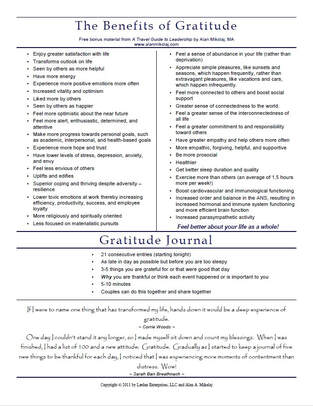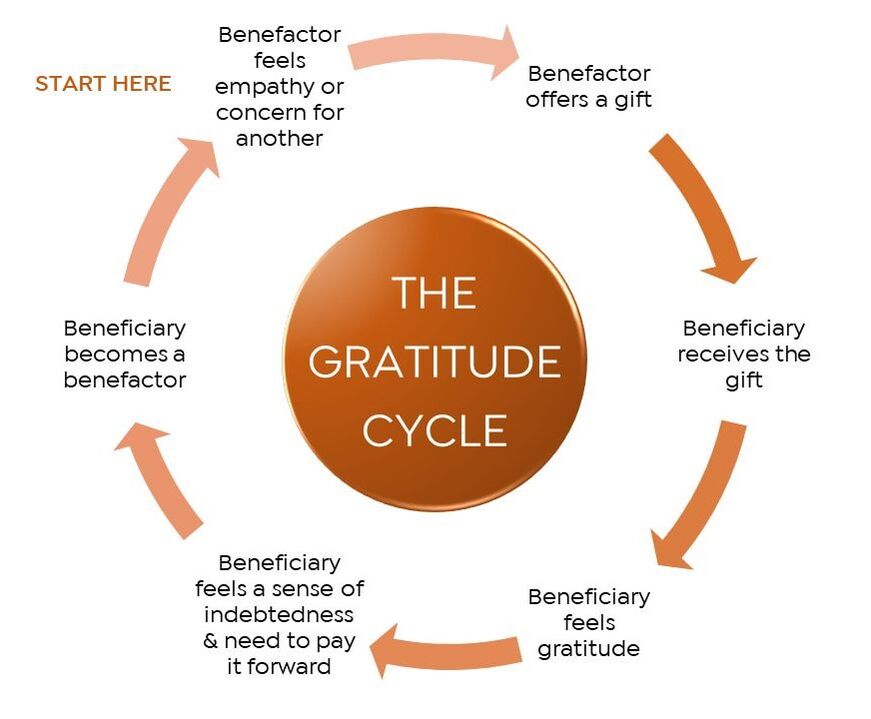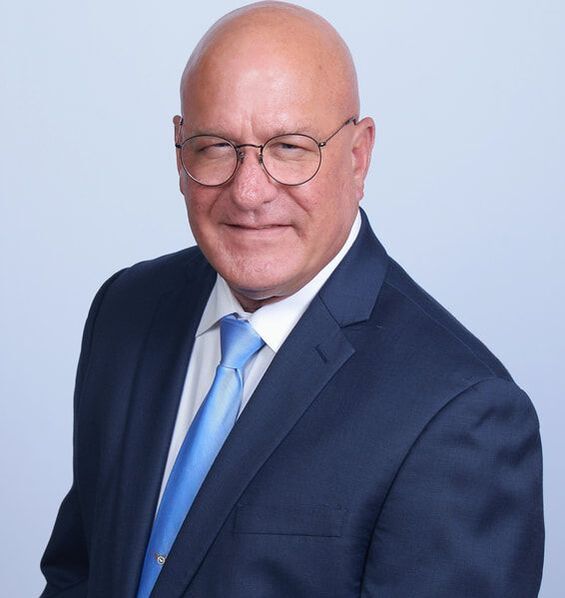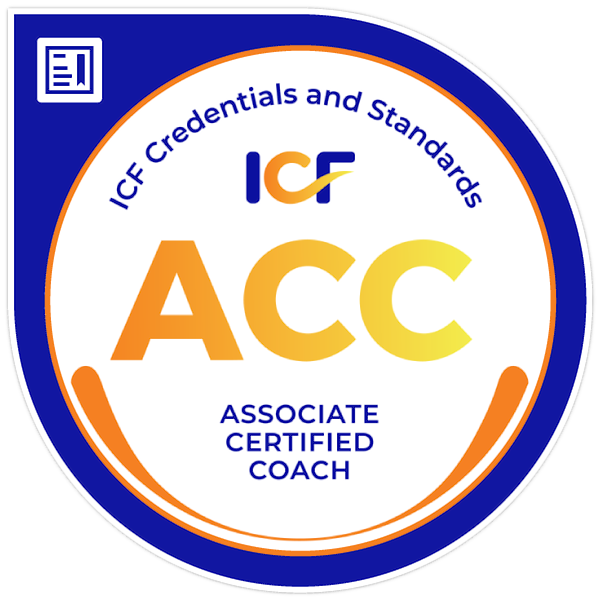Being in a state of gratitude actually creates magnetism, and of course, a magnet draws things to itself. By giving authentic thanks for all the good you now have, as well as the challenges, through this magnetism you’ll start the flow of more good into your life. Every successful person I know is grateful for everything they have. WAYNE DYER November: A Month of Gratitude November is one of my favorite months. Not only is it pleasant outside here in southeastern, coastal Texas for most of the month, it's also National Gratitude Month. In addition to autumn and Thanksgiving, it nourishes me to know that we have an entire month devoted to gratitude. It's one of my core values, second only to love. Why Practice Gratitude? It's good to celebrate and practice gratitude. Why? Start with money, success, and happiness. The research on money, success, and happiness is quite clear: Money and success do not lead to happiness rather; it is happiness that leads to success—in every major life domain. So if happiness leads to success and it isn’t necessarily money that leads to happiness, the question then becomes, “What does lead to happiness?” Gratitude. Consistently practicing gratitude leads to greater happiness (subjective wellbeing) and fulfillment. Defining Gratitude At the risk of sounding a bit too academic, I define gratitude as a cognitive-affective state characterized by the recognition of having received some good or benefit—a gift—from a benefactor, whether distinct or more ethereal. What's really amazing about gratitude is that it's actually in the middle of a positive cycle or spiral. It starts with a benefactor who feels empathy or concern for someone else. We often associate empathy with someone else's negative feelings and experiences and that is true. Empathy can also be expressed during positive states and events; with someone's joys and triumphs. The benefactor then offers a gift. Remember, these types of gifts can be verbal, written, and simple acts of kindness. Gratitude also fosters a desire to ‘pay it forward.’ The beneficiary often has a sense of indebtedness that is felt towards the benefactor that motivates further giving toward the benefactor or someone completely outside the loop. This then creates a spiral of giving, receiving, and repaying. Amplifying Gratitude Another interesting finding from the research is that you can amplify the power of any gift or act which you are hoping will generate gratitude. More gratitude is created when the act or gift meets three criteria:
The research also shows that unexpected benefits or gifts appear to generate the most gratitude. Some of the best benefits and gifts we receive on our life journey are the ones that come as a surprise and are least expected. Practicing Gratitude One of the best ways to practice gratitude is with a gratitude journal. Simply write down 3-5 things you're grateful for at the end of each day and the reason why. In a series of studies, people who daily practiced this reported being more attentive, determined, energetic, enthusiastic, excited, interested, joyful, and strong than the other participants. They were also happier and were also more likely to report that they helped someone with a personal problem or offered emotional support to someone that day. The Morning Cuddle I know a lot of teams that have the practice of a Morning Huddle. My team practices the Morning Cuddle. A major part of what we do during these cuddles, is to identify a few things that we're grateful for to start the day. We have some staples like the gift of life or a new day, Mommy getting things ready downstairs, our pet love birds, and a warm cuddle with Daddy. We also have an evening version. In our Night Cuddle, we share gratitude for those things that happened during the day that we are most grateful for. It's our audible version of the gratitude journal.  Click to download Click to download FREE GIFT! The Benefits of Gratitude Download my free The Benefits of Gratitude guide where I explain how to conduct the two strongest practices from the literature that boost gratitude and happiness:
You'll also discover the benefits of practicing gratitude and other bonus material. You don't have to enter your email. No irritating pop-ups. No junk mail. It's simply my way of expressing gratitude to you for visiting my site and reading my blog. Celebrate National Gratitude Month! We have so much to be grateful for! Have an amazing journey today! Alan Mikolaj is a coach and leadership development consultant with 15+ years of experience. He is passionate about helping leaders transform their leadership, their teams, and their organizations. Impactful, professional approach driven by a passion for meaning and purpose, a growth mindset, and a commitment to excellence and service in order to drive change and results. Alan maintains the ethics and standards of behavior established by the International Coaching Federation (ICF), including the standards regarding confidentiality. You can learn more about them on the ICF website. Transformational change starts with a conversation! Alan is on a mission to partner with like-minded leaders who want to make a positive difference in the world. Schedule your free, one-hour session by clicking here: Discovery Conversation with Alan Or call or email me: Contact Page
0 Comments
82% of managers who enter management positions have not had any formal management and leadership training—they CHARTERED MANAGEMENT INSTITUTE Up until her recent promotion, Mary was a great frontline contributor and as an additional bonus, she was also popular with her peers and colleagues. So it made sense to promote her into management when a position opened up. Unfortunately, Mary's organization offered little to no training, much less any true developmental opportunities. Oh, she got a brief walk-through on a few, key SOPs and some terse training on the software for budgeting, productivity, and performance management. But that was it. This left her experiencing struggles and challenges trying to navigate transitioning into now being the boss of her former peers. She's feeling anxiety and has this recurring and uncomfortable feeling that she is incompetent and unqualified. She has imposter syndrome. Sound familiar? CMI recently conducted a survey of over 4,500 managers and employees across the UK and they report a whopping 82% of bosses are “accidental managers”--and a quarter of those are in senior leadership roles. Additionally, they report that [emphasis added] "a third of current managers and leaders have never received any formal management and leadership training (33%), including a quarter (26%) of senior managers and leaders." You think that's only happening to managers and leaders across the pond? A number of studies have indicated that employer-paid training has been on the decline in the United States for years. And if you've been in the workforce for more than just a few years, you've either experienced the accidental manager phenomenon on one end or the other, witnessed it, or heard about it from someone who has. What is an accidental manager? Anyone who is thrust into a people management or leadership role without the necessary skills, training, or preparation falls under the accidental manager umbrella. This could be someone who has been promoted because of their technical expertise and track record, but lacks the skills and experience in management. The damage of creating accidental managers Accidental management and leadership is pervasive and it's doing damage to teams and organizations and even to the leaders and managers themselves—more than you might think. Just ask Gallup. They report that bad managers cost businesses billions of dollars each year. The term accidental manager can imply that the person may be incompetent, even though it's through no fault of their own. And because managers are often expected to 'know it all,' this can breed a lack of confidence, anxiety, and a sense of alienation or rejection. Like Mary in our example above, many suffer from imposter syndrome. Many are confused about goals, micromanaged, or stuck without proper feedback and guidance. Accidental managers often can be in a phase called ‘unconscious incompetence’ (I don’t know what I don’t know) breeding a false sense of confidence which then puts them in a state of denial that they even need training and development. Because they're often promoted because of their expertise, they are prone to micromanage their team members that report to them and/or not give them the autonomy they need. They are the expert, afterall, right? Wrong. They may be the expert in their previous job, but they are not management or leadership experts... at least not yet, anyway—and micromanaging and not giving proper autonomy are not behaviors of the best managers and leaders. Unfortunately, accidental managers are often disconnected or detached from their team in the more meaningful ways and that causes their team members to feel demotivated and resentful impacting productivity, engagement levels, and even the well-being of team members. In fact, a report by the Workforce Institute at UKG uncovered that managers have "a greater impact on our mental health than doctors and therapists—and even equal to that of spouses and partners."  It's time for leaders and organizations to connect the dots.
It's time for organizations to demand that they have great leaders and great managers and to invest in the training, development, mentoring, and coaching to build them up. All of your key metrics and mission are on the line. There are things you can do about it. WHAT ORGANIZATIONS CAN DO CLICK PLUS SIGNS TO EXPAND Succession Planning
Invest the time and energy to develop and deploy an organization-wide succession plan. The One in Ten
Identify the one in 10 people (high-potentials) across the organization who possess the talent to manage—not just those currently in management and leadership positions. High-Potentials
Develop and implement a high-potential training & development program for your one in 10. New Leader & Manager Training & Development
Develop & implement a new leader/manager training & development program. Go beyond the simple SOPs and software training to include foundational competencies and skills such as purpose-driven leadership, how to conduct one-on-ones & staff meetings, recognition, how to drive employee engagement, conflict management, empathic listening, time management, creating a psychologically safe environment, etc. There are few leadership strategies that have the impact that purpose-driven leadership can offer you. Purpose-driven leadership has been shown to positively impact key metrics such as employee engagement, productivity, innovation, revenue and financials, wellbeing, retention, and most importantly, your leadership confidence and effectiveness! Lucky for you, I have a one-of-a-kind, empiracally-driven, and engaging program just for you: The Purpose-Driven Leadership Program. Check it out. If you have any questions at all, just reach out to me. Here's how: Alan's Contact Information Value Continuing Education & Development
Develop & implement a continuing education/leadership development program. Invest in a skills-gaps analysis to narrow-in on key skills and competenices that need to be boosted and amplified. Make sure that includes people skills, leading with meaning, purpose, & values, and mindset gaps. Mentorship
Develop & implement a mentorship program to include identifying and training mentors. Coaching
Coaching isn't just for executives. All levels can benefit from coaching—even emerging managers and leaders. The longterm positive impacts on teams and organizations include leadership confidence, wellbeing, engagement, retention, goal attainment, productivity, finacials, successful change management, and more. So, are you ready to take your personal and professional life to new heights? Look no further! I'm a seasoned coach with a passion for guiding individuals from all walks of life towards success. From front-line employees to top-tier, C-suite executives, I have an impressive track record of empowering leaders to achieve their goals and maximize their potential. Learn more here: Coaching With Alan 360-Degree Feedback
Implement an annual 360-degree feedback & leadership assessment program. Leaders can identify what they're doing well and what individual developmental opportunities and needs they may have. To learn more about the LPI360, just click here: The LPI360 Accountability
Create accountability measures around training and development. Make it part of performance management for all levels within the organization—and that means supporting the time management needed to do that. Ask an expert
WHAT YOU CAN DO If your organization doesn't offer much in training or development. CLICK PLUS SIGNS TO EXPAND Identify What Success in Your Role Looks Like
Schedule time with your one-up manager or director and ask. Let them know that you're setting some first-year goals and need their help doing that.
Get clear about their time expectations and politely point out anything that seems unrealistic and what why you think that is. If they give vague and unclear answers, follow-up and be persistent. You can ask things like, "If I were to measure that somehow, how would you suggest I do that?" Identify Skill gaps
What skills are needed to succeed in your role? Ask your one-up, others in similar roles, and others who have been in your role what skills are most-needed for success? What do you need to know (or know how to do) that you don't even know that you need to know? Then, find the best resources to improve your skills. Find blogs that offer pointers, and tips, or enroll in an introduction to management short course to teach you the basics. Do some research and check reviews. TIME MANAGEMENT
Time management is a universal skill all managers and leaders need to master. There are numerous tools and strategies like the Eisenhower Matrix and the Pomodoro Technique that are simple quick-starters. However, a time management course is worth its weight in gold. Like a skill gap, do your research but don't get bogged-down with analysis paralysis. Remember, time's a wasting. Purpose-Driven Leadership
There are few leadership strategies that have the impact that purpose-driven leadership can offer you. Purpose-driven leadership has been shown to positively impact key metrics such as employee engagement, productivity, innovation, revenue and financials, wellbeing, retention, and most importantly, your leadership confidence and effectiveness! Lucky for you, I have a one-of-a-kind, empiracally-driven, and engaging program just for you: The Purpose-Driven Leadership Program. Check it out. If you have any questions at all, just reach out to me. Here's how: Alan's Contact Information Coaching
Coaching isn't just for executives. All levels can benefit from coaching—even emerging managers and leaders. Are you ready to take your personal and professional life to new heights? Look no further! I'm a seasoned coach with a passion for guiding individuals from all walks of life towards success. From front-line employees to top-tier, C-suite executives, I have an impressive track record of empowering leaders to achieve their goals and maximize their potential. Learn more here: Coaching With Alan 360-Degree Feedback
If you've been in your role at least six months, conduct an annual 360-degree feedback & leadership assessment to identify what you're doing well and what your individual developmental opportunities and needs are. To learn more about the LPI360, just click here: The LPI360 Coaching
Coaching isn't just for executives. All levels can benefit from coaching—even emerging managers and leaders. The longterm positive impacts on teams and organizations include leadership confidence, wellbeing, engagement, retention, goal attainment, productivity, finacials, successful change management, and more. So, are you ready to take your personal and professional life to new heights? Look no further! I'm a seasoned coach with a passion for guiding individuals from all walks of life towards success. From front-line employees to top-tier, C-suite executives, I have an impressive track record of empowering leaders to achieve their goals and maximize their potential. Learn more here: Coaching With Alan Ask an Expert
Have an amazing journey today! Alan Mikolaj is a coach and leadership development consultant with 15+ years of experience. He is passionate about helping leaders transform their leadership, their teams, and their organizations. Impactful, professional approach driven by a passion for meaning and purpose, a growth mindset, and a commitment to excellence and service in order to drive change and results. Alan maintains the ethics and standards of behavior established by the International Coaching Federation (ICF), including the standards regarding confidentiality. You can learn more about them on the ICF website. Transformational change starts with a conversation! Alan is on a mission to partner with like-minded leaders who want to make a positive difference in the world. Schedule your free, one-hour session by clicking here: Discovery Conversation with Alan Or call or email me: Contact Page The fundamental thing for anybody, any relationship or any expedition or anything is communication. CHARLIE BOORMAN Our ability to communicate is one of the most important tools of leadership—some even argue it is the most important skill or competency. It's how we send and receive important information, motivate, and show that we care. The first step of effective communication is attention. Mary Oliver, a National Book Award and Pulitzer Prize-winning poet, beautifully expressed this when she said, "To pay attention, this is our endless and proper work." Scott M. Peck, the author of 'The Road Less Traveled,' echoed this sentiment by stating, “The principal form that the work of love takes is attention… By far the most common and important way in which we can exercise our attention is by listening.” Moving on to the second step of effective communication: Listening. Listening isn't just an important skill; it's the cornerstone of the Communication Expedition. I call it an expedition because every time we communicate during our leadership journey, it's a unique and thrilling adventure—an opportunity to both learn and grow. Have you ever been on an expedition? There's a sense of excitement and anticipation as you set out. When we view our communications as an expedition, we embark on a quest to discover something new, even if it's not always pleasant or expected. We set aside our preconceived notions and eagerly anticipate what will be revealed to us. We remain open and ready for anything. This leads us to the third step of effective communication: A sense of curiosity. To listen and communicate effectively, approaching each interaction with curiosity creates space for anything. As Dale Carnegie wisely said, "The royal road to a person's heart is to talk to them about the things they treasure most." Remember that the Communication Expedition is a journey of attention, listening, and curiosity. By practicing these three steps, you'll not only become a better communicator but also a more effective leader. Communication is the wind in your sails, propelling you forward on the voyage of understanding and connection. So, set sail on this remarkable expedition and watch your leadership skills reach new horizons. Have an amazing journey today! Alan Mikolaj is a coach and leadership development consultant with 15+ years of experience. He is passionate about helping leaders transform their leadership, their teams, and their organizations. Impactful, professional approach driven by a passion for meaning and purpose, a growth mindset, and a commitment to excellence and service in order to drive change and results. Alan maintains the ethics and standards of behavior established by the International Coaching Federation (ICF), including the standards regarding confidentiality. You can learn more about them on the ICF website. Transformational change starts with a conversation! Alan is on a mission to partner with like-minded leaders who want to make a positive difference in the world. Schedule your free, one-hour session by clicking here: Discovery Conversation with Alan Or call or email me: Contact Page I cannot endure to waste anything so precious as autumnal sunshine by staying in the house. NATHANIEL HAWTHORNE While the official first day of autumn occurred a couple of weeks ago, it sure hasn't felt like it here in the southeastern Texas coastal area until this past Friday morning. Wherever you are, that first day after the first cold front of autumn comes through bringing with it what seems like the bluest skies of the year, crisp morning breezes, and warm afternoons marks a transition that we can feel deep in our psyche, deep down in our bones, in our very soul. If spring represents new beginnings, childhood, and rapid growth, and if summer symbolizes youth and exuberance, then autumn represents adulthood, maturity, and harvesting abundance. The changing of any season also reminds us of the impermanence of all things, that change is constant, and that there are cycles to all things. As leaders we may more often think of business cycles, revenue cycles, change management patterns and cycles, scheduling and supply chain cycles, and the like. As we lead through these inevitabilities, let us not forget the human cycles and transitions that people may be facing in their lives or going through. This line of thinking can be informed by the distinction between managing and leading. It reminds me of what James Hunter wrote in his powerful book, The Servant: A Simple Story About the True Essence of Leadership, (emphasis in the original): You manage things, you lead people. As a leader, you manage many resources: budgets and money, time and schedules, materials and supplies, intellectual capital, emails, and the like. I often hear business leaders say, “Our people are our most valuable resource.” The position a person fills is a resource—something you manage; the person is a fellow human being—someone you lead. This is not merely a play on semantics. Looking at the origin of the words manage and lead provides a more clear understanding. The word manage originates from the Latin manus or ‘hand’ and was originally used in regards to horse-handling and training. The word lead, on the other hand, finds its origins in the Middle English word leden meaning “to conduct, accompany; bring, take, or guide” and the Old English lǣdan meaning “to go by sea, sail, or travel”—and it is this root word that inspires the name of my company. To be a leader is to be a travel guide of sorts—to lead and be on a journey through the seasons of life with others. Referring to your people as a ‘resource’ risks dehumanizing them, even if on a subtle level. Your direct reports, management team, little league team, church choir members, and family—all of the people you lead—are people worthy of respect and concern. They are not things, nor are they resources in the strictest sense. They are people on their journey through life and you happen to be accompanying them along the path for this short while. The position that someone fills is a resource that you manage. The schedule, work assignments, compensation and benefits, required skills and knowledge, and the results produced are the resources. The person, however, is someone very much like you who has dreams, wants to be happy, desires to contribute meaningfully to the world, and wants to love and be loved. They are living through cycles and seasons. And just like you, they can be inspired by great leadership or be demoralized by the inept or callous. So like Nathaniel Hawthorne, take some time and get outside and get out in the autumn sunshine and reflect on life, your leadership, and those you lead. What is the essence of your leadership purpose and principle? As we bask in the warm glow of autumn, consider revisiting your leadership purpose and principles. What drives you as a leader? What values do you hold dear? Autumn reminds us to take stock of what truly matters and align our leadership with those principles. How can you show up more consistently as your best self each day? Autumnal sunshine brings clarity and a sense of purpose. Use this clarity to bring your best self to your leadership role every day. Consistency in your actions and demeanor can inspire trust and confidence in your team. How can you be more open to seeking and receiving feedback on your leadership and its impact on your team culture? Just as trees shed their leaves in the fall, be open to shedding any ego-driven resistance to feedback. Embrace the opportunity to grow and evolve as a leader by actively seeking and gracefully receiving constructive input. What words and behaviors can you adjust to boost your leadership effectiveness? Like the changing colors of autumn leaves, adjust your words and behaviors to better align with your leadership goals. Sometimes, small changes can yield significant results in your effectiveness as a leader. How can you be more aware of what those you lead may be going through right now? As the world transforms with the seasons, so do the lives of those you lead. Take the time to listen, empathize, and understand the challenges and transitions your team members may be experiencing. Your leadership can provide much-needed support during their journey. How can you be the autumnal sunshine for your team? Just as the autumn sun warms and brightens the world, your leadership can bring light and warmth to your team's environment. Encourage, motivate, and uplift your team members, helping them thrive in both their personal and professional lives. As we embrace the beauty and symbolism of autumn, let it remind us that leadership is not just about managing resources but about guiding and nurturing people. Be the leader who shines like autumnal sunshine, warming the hearts and souls of those you have the privilege to lead. Have an amazing journey today! Alan Mikolaj is a coach and leadership development consultant with 15+ years of experience. He is passionate about helping leaders transform their leadership, their teams, and their organizations. Impactful, professional approach driven by a passion for meaning and purpose, a growth mindset, and a commitment to excellence and service in order to drive change and results. Alan maintains the ethics and standards of behavior established by the International Coaching Federation (ICF), including the standards regarding confidentiality. You can learn more about them on the ICF website. Transformational change starts with a conversation! Alan is on a mission to partner with like-minded leaders who want to make a positive difference in the world. Schedule your free, one-hour session by clicking here: Discovery Conversation with Alan Or call or email me: Contact Page Everyone who remembers his own education remembers teachers, not methods and techniques. SIDNEY HOOK Thursday, October 5 is World Teacher's Day, and indeed, teachers are the heart of education. Without teachers, educators, and trainers guiding your growth and developmental journey, you could not have become the person and leader you are today. And while as the husband of an award-winning and amazing elementary school teacher and the father of twin eight-year-old boys I want to celebrate this day; I am very concerned. Many good teachers are leaving the profession they love, and fewer young people aspire to become teachers—and for good reasons. School teachers are facing an onslaught of challenges like never before. That's why this year's World Teacher's Day theme is: The teachers we need for the education we want: The global imperative to reverse the teacher shortage. I still find it hard to believe that my wife and teachers all over the US have to attend required active-shooter trainings before school even starts, drill for nightmarish scenarios with police, and then drill their students off and on throughout the school year. The rampant gun violence in our country and its impact on our educational systems are a failure of leadership, and of ourselves as voter/citizens, at every level of our threatened democracy. In addition, new laws regularly restrict what and how educators teach. Book-bans that are contrary to a democratic society and to education thwart access to literary classics. Cuts in funding strip away vital education resources and lower teacher salaries. We’re facing a dangerous time when even schools with plenty of funding still may not be able to find qualified teachers willing to stay in the classroom. And while these may be mine and others' concerns about what challenges teachers, when you ask teachers—and TeacherVision did—here's what they report:
That's how you show teacher appreciation! Have an amazing journey today! Alan Mikolaj is a coach and leadership development consultant with 15+ years of experience. He is passionate about helping leaders transform their leadership, their teams, and their organizations. Impactful, professional approach driven by a passion for meaning and purpose, a growth mindset, and a commitment to excellence and service in order to drive change and results. Alan maintains the ethics and standards of behavior established by the International Coaching Federation (ICF), including the standards regarding confidentiality. You can learn more about them on the ICF website. Transformational change starts with a conversation! Alan is on a mission to partner with like-minded leaders who want to make a positive difference in the world. Schedule your free, one-hour session by clicking here: Discovery Conversation with Alan Or call or email me: Contact Page |
Alan Mikolaj
Alan Mikolaj is a a professional, experienced, positive, and passionate speaker, leadership and organizational development consultant, change agent, author, and coach. He holds his Master of Arts degree in Clinical Psychology from Sam Houston State University. He is a certified graduate coach from Coaching Out of the Box and holds his ACC and membership with the International Coaching Federation (ICF). Free Discovery Conversation!
Impactful change starts with a conversation! Schedule your free, one-hour session by clicking here: Discovery Conversation with Alan
Or call or email: Contact Page In his third book, A Travel Guide to Leadership, Alan offers you simple, fundamental, and powerful lessons that have the power to transform you, your relationships, and your career.

Blog Archives
July 2024

Linked2Leadership
Ranked #1 Business Blog! |
|
CONTACT
TEL: 346-291-0216 EMAIL: [email protected] SCHEDULE TIME WITH ALAN Free Discovery Conversation with Alan |




















